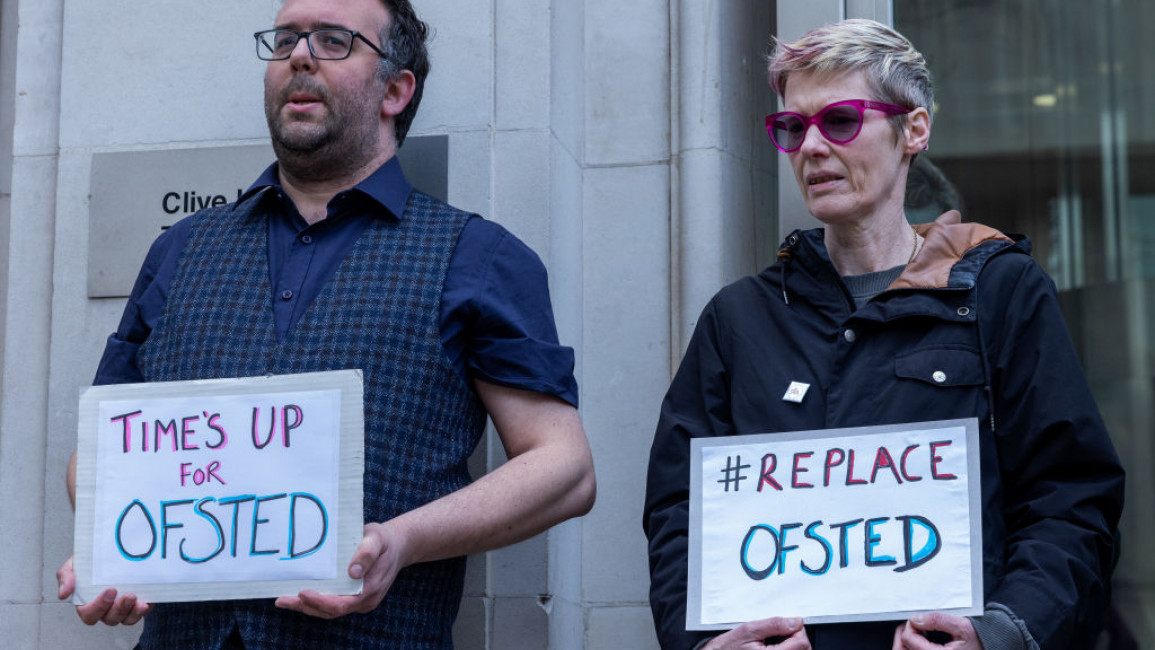
UK teachers & schools educating future generations are unfairly judged
Imagine you get a phone call informing you that in twenty-four hours you’ll be visited by an inspector. They’ll come to your home and they’ll scrutinise your life. Inside out. They’ll watch you feed your kids freezer food and they’ll run an accusatory finger across the dusty surfaces that you forgot were there. They’ll open that cupboard that holds all the rubbish you should really throw away and they’ll judge your taste in trashy TV. They’ll see you bicker with your partner and ask why your phone suggests you’ve ignored five calls from your mother in a row. With raised brows and pursed lips, they’ll prod that dead houseplant in the corner and ask when you last watered it.
Then they’ll judge you. As a partner, a parent, as a human being. They’ll declare that you are ‘Good’ or that you ‘Require Improvement’. But, of course, it won’t be fair or representative. Peeping into someone’s life for a mere few hours can never give an accurate picture of their adequacy or impact as a person.
Here’s the thing: if you had the resources and the wherewithal to hire a cleaner and to send your unruly kids to a nanny for the day then you’ll probably get an ‘Outstanding’. But if you are battling through life under the insurmountable pressures of poverty, working all hours of the day to keep a roof over your head with little time to hoover the carpet or fluff up the duvets then they’ll probably look at you a little less favourably. ‘Inadequate’ for you.
''Privilege sells in the Ofsted stakes and Ofsted plays a significant part in orchestrating the gaping chasm between the rich and poor in our nation.''
This is what it feels like to work in a British school and to be inspected by Ofsted. This is how stressful and how unfair it feels to the teachers and leaders who dedicate their time, day in day out, to educating the next generation.
Ofsted having been having a tough time in the press recently - since the tragic suicide of a headteacher following an inspection of her school in which it was downgraded from ‘Outstanding’ to ‘Inadequate’. For many teachers like me, it feels like public perception is finally catching up with how many of us in the profession have felt for a long time. But why did it take such a drastic event for Ofsted’s illicit, unjust and downright damaging nature to be exposed?
A leaked government report recently found that teachers are routinely working upwards of twelve hour days. Three quarters of teachers describe their workload as “unacceptable” with half of all teachers describing their anxiety levels as “high”. Thanks to a combination of government cuts, the legacy of the pandemic and changes to the way students and schools are assessed which drives competition (and therefore pressure) in the sector, teaching is already a demanding and exhausting job. But add an Ofsted inspection to the mix and the anxiety can tip many over the edge.
OFSTED 1: inspector sits next to the only student in a hijab, asks her if I have taught them about radicalisation. OFSTED 2: inspector stops me teaching Yr7, asks me to point out the disadvantaged students. OFSTED 3: inspector tells me I’m not allowed to ask what her subject is.
— Nia Broomhall (@niaandthepoems) April 23, 2023
It’s referred to as “the call” by those in the profession, and the news that Ofsted is coming sends most schools into a frenzy of last minute marking, display-adjusting and rehearsing to be grilled. I’ve known of teachers staying in schools working until midnight the night before an inspection because Ofsted is such an anxiety-inducing force of scrutiny that they’re worried inspectors will pick up on the tiniest of details . This could be anything from their powerpoint slides being the wrong colour for dyslexic learners, to why their classroom is still displaying work from three years ago.
This current wave of criticism aimed at Ofsted has provoked many school leaders to speak out about how Ofsted has impacted their mental health and that of their staff, with some describing the buildup to an inspection as “a form of prolonged torture waiting for public trial and execution”.
That’s the problem. It’s not just the intense, crippling stress over the forty-eight hour period that Ofsted are scrutinising your school. It is the intimidating sceptre of Ofsted itself and how it looms over every school, with its hand in a chokehold around every leader’s throat, and the trickle-down effect this has on teachers.
I’ve lost count of the amount of, frankly, nonsensical school initiatives that I’ve seen implemented because someone somewhere says Ofsted is looking for that: from displaying three different learning objectives on every single slide to “prove” that you are catering to all learners, to marking students on fifty different key progress indicators that neither the students nor the teachers really understand. Everyone is scared of Ofsted, and that very real fear creates an environment in schools that is unliveable and hostile.
It’s not just about the impact on individual teachers. It’s worth asking whether it is responsible or right that an all-powerful body like Ofsted has the ability to do so much damage with a single one-word judgement garnered over a mere few hours in the first place. An Ofsted judgement is an incredibly public brush and it can be used to tarnish not just a given school but the entire community too - and the future prospects of the next generation in that area.
One head told me Ofsted complained that the Yr 6 scores didn't show improvement from Yr 4 scores. Head told Ofsted that they weren't the same children and Yr 6 was largely refugee kids from local hostel. Ofsted said, 'should still show improvment'. (Scores not attached to kids!)
— Michael Rosen 💙💙🎓🎓 (@MichaelRosenYes) April 23, 2023
Evidence gathered by the Institute of Education over a number of years found that since fundamental changes to the education sector in 2010, schools have been divided into “winners” and “losers” with clear disparities in poverty indicators between “Outstanding” versus “Inadequate” schools. Simply put, the more students on free school meals, the more likely that school is to be rated poorly by Ofsted and the opposite is true too. When you consider how house prices can soar as much as £37,000 in response to an “Outstanding” Ofsted grade, and the knock-on effect this has on who has access to brilliant schools and the opportunities they afford, then the brutal truth is laid bare.
Privilege sells in the Ofsted stakes and Ofsted plays a significant part in orchestrating the gaping chasm between the rich and poor in our nation.
Education is more than a single word grade. Ofsted's approach of reducing schools to a simplistic rating system fails to capture the complexities of education. It’s time to replace Ofsted. #EducationMatters #NoToSingleGrades
— Kevin Courtney (@cyclingkev) April 23, 2023
Across the sector, people are redefining the future of education, including through teachers’ strikes, and calls for changes to Ofsted cannot be removed from that. The legacy of austerity has deep, deadly roots in our schools, colleges and universities and cuts to vital services by successive Conservative governments has decimated not only our institutions but the futures of the most disadvantaged communities who rely on them.
Demanding Ofsted is held to account is the same rallying cry as pushing for fairer wages for teachers, better conditions for university lecturers or grassroots movements to save our institutions from privatisation. It is about making sure education breaks down class barriers that rule our society rather than upholding them.
Nadeine Asbali is a secondary school teacher in London.
Follow her on Twitter: @najourno
Have questions or comments? Email us at: editorial-english@newarab.com
Opinions expressed here are the author's own, and do not necessarily reflect those of their employer, or of The New Arab and its editorial board or staff.


![Minnesota Tim Walz is working to court Muslim voters. [Getty]](/sites/default/files/styles/image_684x385/public/2169747529.jpeg?h=a5f2f23a&itok=b63Wif2V)




